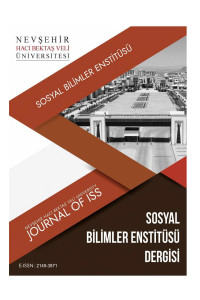Öz
This study aims to analyze Necip Fazıl Kısakürek’s poem Letter to Mehmed from the Dungeon through the lens of Michel Foucault’s theories of power and confinement. Focusing on the disciplinary mechanisms of the 20th century, this article questions how the prison experience is not only viewed as an individual fate but also how it relates to modern power’s systems of control and surveillance. Foucault’s concept of the “great confinement” encompasses not only physical prisons but also the invisible boundaries that society imposes on the individual. In Necip Fazıl’s poem, the convict is not depicted merely as a body trapped within four walls but also as someone experiencing mental and spiritual imprisonment. By analyzing the voice in the poem, we see that confinement is not just a physical condition; it also controls the individual at the levels of thought and identity. This imprisonment goes beyond mere bodily restriction, merging with the control over thought and identity. The article examines the poem in the context of these disciplinary mechanisms and discusses how literature intersects with structures of power, as well as the ways in which the individual develops resistance against these structures. Paralleling Foucault’s concept of power this poem reveals how social control is internalized and simultaneously presents a form of rebellion and resistance against it. In this context, Letter to Mehmed from the Dungeon can be considered not only as a work describing the cry of a prisoner, but also as a profound text demonstrating how modern society shapes and confines the individual.
Anahtar Kelimeler
Necip Fazıl Kısakürek Letter from the Dungeon to Mehmed Michel Foucault power great confinement.
Kaynakça
- Altunok, G. (2007). Power as Critique of Violence: Arendt and Foucault. East West Publications, 51-74.
- Bachelard, G. (2008). Poetics of Space. (A. Türkmen, Trans.). Istanbul: Ittihaki Publications.
- Falzon, C. (2001). Foucault and Social Dialogue/Beyond Fragmentation. (H. Arslan, Trans.). Istanbul: Paradigma Publications.
- Foucault, M. (2011). The Great Confinement. (I. E. Keskin, Trans.). Istanbul: Ayrıntı Publications.
- Foucault, M. (2011). Subject and Power. (I. Ergüden & O. Akınhay, Trans.). Istanbul: Ayrıntı Publications.
- Fuat, M. (2011). Anthology of Contemporary Turkish Poetry II. Istanbul: Adam Publications.
- Kısakürek, F. N. (2012). The Ordeal. Istanbul: Great East Publications.
- Kısakürek, F. N. (2010). Faith and Action. Istanbul: Great East Publications.
- Kısakürek, F. N. (1999). Orations. Istanbul: Great East Publications.
- Kısakürek, F. N. (1998). What I Heard from a Servant of God. Istanbul: Great East Publications.
- Kısakürek, F. N. (1986). The Pattern of Ideology. Istanbul: Great East Publications.
- Paz, O. (1995). Bow and Lyre/What is Poetry? (Ö. Saruhanlıoğlu, Trans.). Istanbul: Era Publications.
Öz
Bu çalışma, Necip Fazıl Kısakürek’in Zindandan Mehmed’e Mektup adlı şiirini, Michel Foucault’nun iktidar ve kapatılma kuramları perspektifinden incelemeyi hedeflemektedir. 20. yüzyılın disiplin mekanizmaları üzerine odaklanan bu makale, hapishane deneyimini sadece bireysel bir kader olarak görmekle kalmayarak modern iktidarın kontrol ve gözetim sistemleriyle nasıl ilişkili olduğunu sorgular. Foucault’nun “büyük kapatılma” kavramı, yalnızca fiziksel hapishaneleri değil toplumun birey üzerindeki görünmeyen sınırlarını da kapsar. Necip Fazıl’ın şiirinde ise mahkûm yalnızca dört duvar arasında sıkışmış bir beden olarak tasvir edilmez bunun yanı sıra zihinsel ve ruhsal bir tutsaklık içindedir. Şiirin sesini analiz ettiğimizde kapatılmanın yalnızca fiziksel bir durum olmadığını, bireyin düşünsel ve kimliksel düzeyde de denetim altında tutulduğunu gösterdiğini görürüz. Bu tutsaklık, sadece bedensel bir sınırlama olmanın ötesine geçer ve düşünce ile kimliğin kontrolüyle birleşir. Makale, şiiri bu disiplin mekanizmaları ekseninde ele alarak edebiyatın iktidar yapılarıyla nasıl kesiştiğini ve bireyin bu yapılar karşısında direnç geliştirme yollarını tartışmaktadır. Foucault’nun iktidar anlayışı ile paralellik gösteren bu şiiri, bireyin tutsaklığını toplumsal denetiminin nasıl içselleştirildiğini gözler önüne sererken buna karşı geliştirilen bir isyan ve direnç biçimini de ortaya koyar. Bu bağlamda Zindandan Mehmed’e Mektup sadece bir mahkûmun feryadını anlatan bir eser değil modern toplumun bireyi nasıl şekillendirdiğini ve tutsak ettiğini gösteren derin bir metin olarak da değerlendirilebilir.
Anahtar Kelimeler
Necip Fazıl Kısakürek Zindandan Mehmed’e Mektup Michel Foucault iktidar büyük kapatılma.
Kaynakça
- Altunok, G. (2007). Power as Critique of Violence: Arendt and Foucault. East West Publications, 51-74.
- Bachelard, G. (2008). Poetics of Space. (A. Türkmen, Trans.). Istanbul: Ittihaki Publications.
- Falzon, C. (2001). Foucault and Social Dialogue/Beyond Fragmentation. (H. Arslan, Trans.). Istanbul: Paradigma Publications.
- Foucault, M. (2011). The Great Confinement. (I. E. Keskin, Trans.). Istanbul: Ayrıntı Publications.
- Foucault, M. (2011). Subject and Power. (I. Ergüden & O. Akınhay, Trans.). Istanbul: Ayrıntı Publications.
- Fuat, M. (2011). Anthology of Contemporary Turkish Poetry II. Istanbul: Adam Publications.
- Kısakürek, F. N. (2012). The Ordeal. Istanbul: Great East Publications.
- Kısakürek, F. N. (2010). Faith and Action. Istanbul: Great East Publications.
- Kısakürek, F. N. (1999). Orations. Istanbul: Great East Publications.
- Kısakürek, F. N. (1998). What I Heard from a Servant of God. Istanbul: Great East Publications.
- Kısakürek, F. N. (1986). The Pattern of Ideology. Istanbul: Great East Publications.
- Paz, O. (1995). Bow and Lyre/What is Poetry? (Ö. Saruhanlıoğlu, Trans.). Istanbul: Era Publications.
Ayrıntılar
| Birincil Dil | İngilizce |
|---|---|
| Konular | Dilbilim (Diğer) |
| Bölüm | TÜRK DİLİ VE EDEBİYATI |
| Yazarlar | |
| Erken Görünüm Tarihi | 25 Haziran 2025 |
| Yayımlanma Tarihi | 27 Haziran 2025 |
| Gönderilme Tarihi | 13 Nisan 2025 |
| Kabul Tarihi | 21 Haziran 2025 |
| Yayımlandığı Sayı | Yıl 2025 Cilt: 15 Sayı: 2 |


